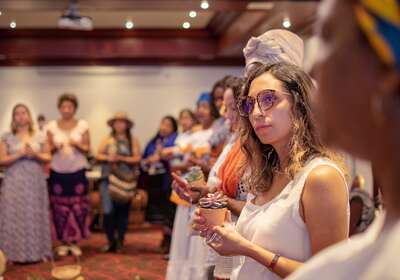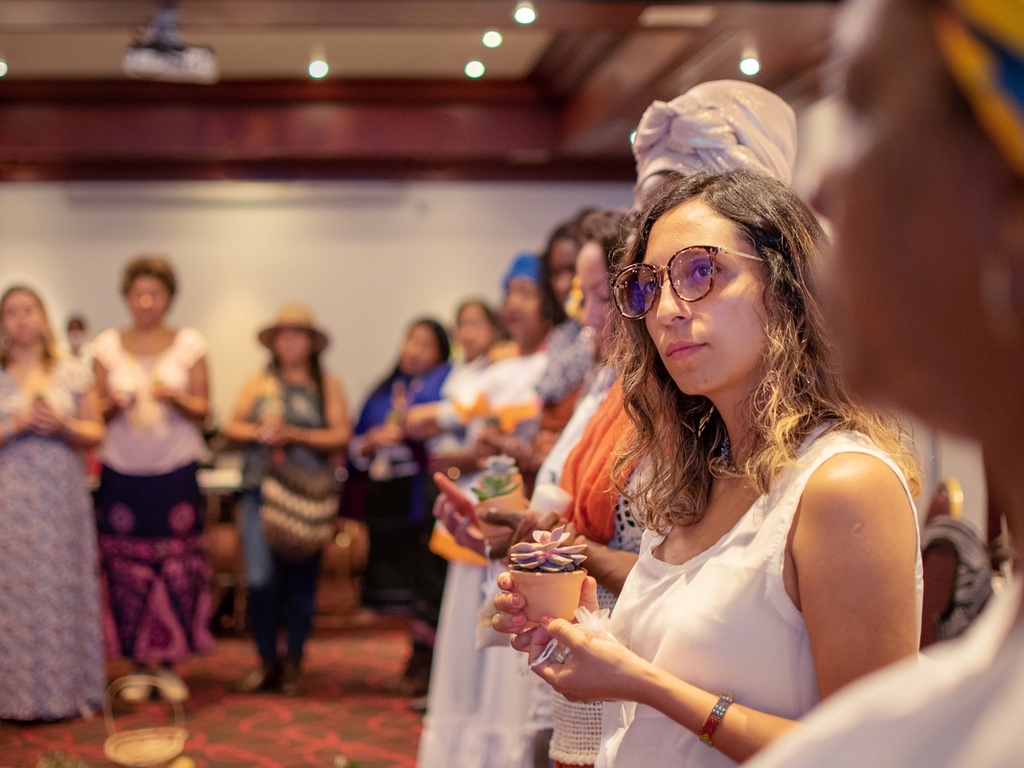Colombia, Ukraine and Feminist Peace Initiatives: Newsletter 2/2022
In this newsletter you will learn about the exemplary work of the Colombian Truth Commission, involving women and marginalised groups – and about how we contributed.


The Colombian Truth Commission has carried out exemplary work. Women, marginalised groups and the diaspora were actively involved in the process of truth-seeking and dealing with the history of the armed conflict. The commission’s mandate has ended, but the peace work continues.
There are numbers that stun: 8 million displaced; at least 450,000 people killed; 120,000 forcibly disappeared; 30,000 documented cases of sexualised violence. There are also numbers that impress: 8,000 pages documenting serious human rights violations and filled with dozens of forward-looking recommendations – and with the voices of 30,000 people telling their stories of suffering and resistance. Among them, the voices of women.
The peace agreement signed at the end of 2016 between the FARC-EP (Fuerzas Armadas Revolucionarias de Colombia - Ejército del Pueblo) and the Colombian government officially ended one of the world’s longest armed conflicts after more than 50 years. The Truth Commission was created as one of the three institutions that make up the “Comprehensive System for Truth, Justice, Reparation and Guarantees of Non-Recurrence in Colombia”. The Commission began its work in 2018, with the aim of documenting human rights violations and finding explanations as to why the conflict lasted for decades. The final report, submitted in June, contains recommendations aimed at ending the violence that continues due to a militarised drug policy and the continuing activity of paramilitary groups, among other reasons.
The Colombian peace agreement was already a model for the inclusion of marginalised communities and women. The fact that the experiences of women and LGBTIQ+ people were included in the peace negotiations is also owing to the active women’s and LGBTIQ+ movements. Thanks to them, the Commission’s final report includes the 644-page volume “My body is the truth”, which pays tribute to the experiences of 10,864 women who were multiply affected by the conflict. Thousands of them experienced sexualised violence at the hands of both parties to the conflict and the security forces. The volume also depicts the enormous debt Colombia owes to LGBTIQ+ people who have been branded as “sick” or “criminals”.
As a feminist on the Commission, it was a great opportunity to explain to society how patriarchy, racism and discrimination fostered, justified and legitimised violence against women and LGBTIQ+ people.
“As a feminist on the Commission, it was a great opportunity to explain to society how patriarchy, racism and discrimination fostered, justified and legitimised violence against women and LGBTIQ+ people,” Salomé Gómez Corrales, Gender Coordinator of the Colombian Truth Commission, tells us. It was her team that convinced the Commission to dedicate a separate chapter to women and LGBTIQ+ people in the final report. “Without the voices of women, it would not have been possible to clarify what happened in the Colombian conflict,” she says. The state had violated their fundamental rights and thus exposed them to violence. The 10,864 women told their stories “to find relief and to demand from the government and society that this violence not be repeated”. She counts the nationwide publication of the chapter on women and the LGBTIQ+ community among the moments of the “greatest joy and peace of mind” of the past five years.
The testimonios, the testimonies of the witnesses to the conflict, play a central role in establishing the truth and in reconciliation, explains Carla Ruta from our cooperation partner, the Switzerland-Colombia Working Group. The conflict has polarised society. “Everyone sees only the victims and suffering of their own camp. This report lets everyone have their say.” The testimonies of 2000 members of the diaspora were also included, which is otherwise largely ignored by truth commissions.
Since 2016, hundreds of conflict-affected women have participated in Women’s Peace Tables (WPTs), which we have conducted together with our project partners Comunitar and Ruta Pacífica de las Mujeres. At the WPTs, they worked through their experiences of violence and resistance, received psycho-social support, formulated strategies together and made demands for a new social order, united by their striving for peace and truth, says Zully Meneses Hernández, Director of Comunitar. Truth Commission staff recorded many of the women’s testimonios at the WPTs. In this way, they became part of the final report and of Colombian history. The fact that the women’s experiences are made visible in the report is a tribute to their contribution to peacebuilding, says Zully.
The newly elected left-progressive government in Colombia has promised to implement the Commission’s recommendations and will hold consultations with representatives of the women’s movement to create a national action plan for the implementation of UN Security Council Resolution 1325 on “Women, Peace and Security”. The armed conflict may officially be over, but women continue to be exposed to violence and to a militarised understanding of security. The peace work continues
“We bring a message of hope and a future for our broken and shattered country. Uncomfortable truths that challenge our dignity, a message for all of us as human beings… A message of truth to end the unbearable tragedy of conflict...”
So begins the final report presented by the Commission on 28 June 2022. The newly elected president, Gustavo Petro, said at the time that the “permanent cycle of violence” must be severed. The Truth Commission’s report, he said, forms the basis for peaceful coexistence in the future.
Here are some of the most important recommendations:
The government should press ahead with the full implementation of the Peace Agreement, including negotiations with the Ejército de Liberación Nacional ELN. The security of former combatants should be guaranteed.
A new vision of security should be created that promotes peace as a public good, with people at the centre.
A new Ministry of Peace and Reconciliation should be responsible for the implementation of the peace process and contribute to reconciliation in general.
The report on women and LGBTIQ+ people, “Mi cuerpo es la verdad”, lists 15 pages of concrete recommendations:
Strengthen state capacities to make progress on gender equality.
Strengthen the role of women and ensure adequate reparations for women victims of the armed conflict.
Seek cultural and social changes to end violence against women, including a call to the government to sign agreements for women’s equality and the abolition of patriarchy “to build peace.”
More information on the Commission’s website:
www.comisiondelaverdad.co